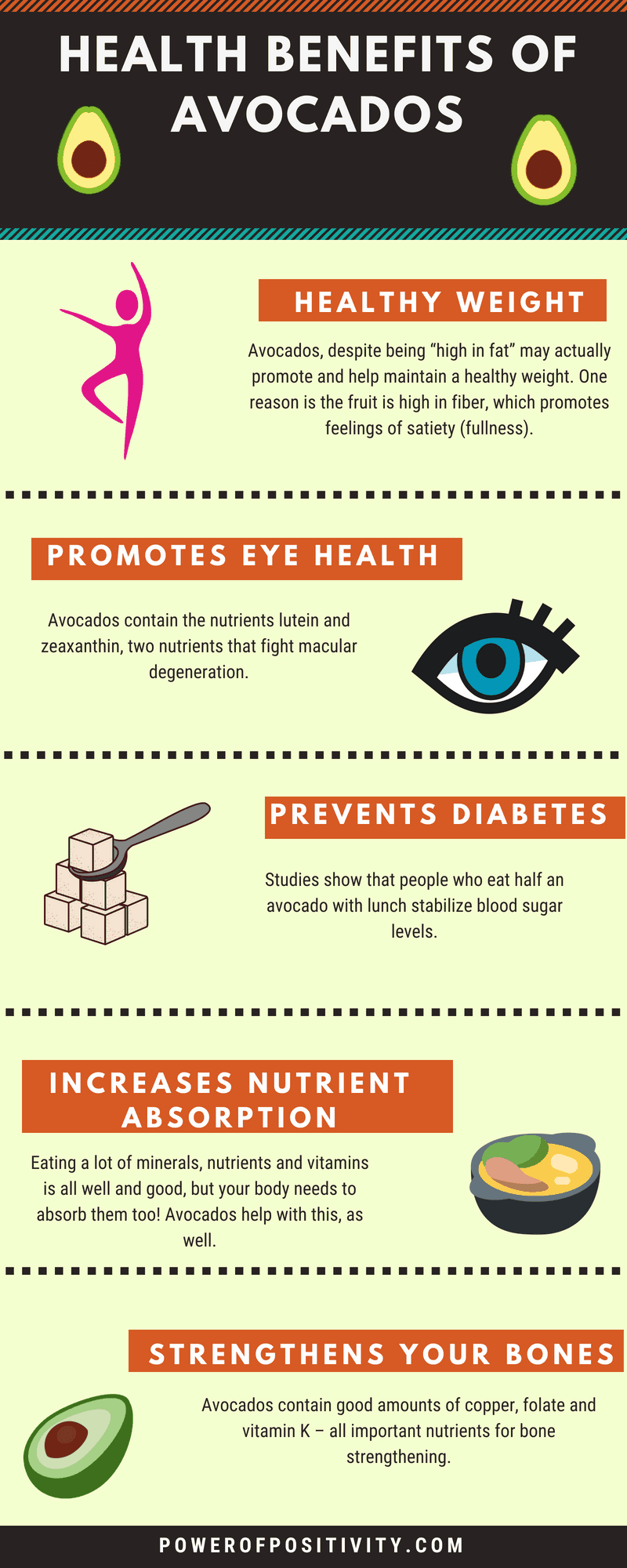Here’s a question to get us started: what foods can you think of that are both healthy and delicious? The last word is ‘delicious’ and not ‘tolerable’, folks. If we’re honest with ourselves, we’ll concede that there are not too many foods that check both of these boxes. Those that do will probably fall under one of two categories: fruits or vegetables.
This segues into our discussion of avocados and the health benefits derived from the versatile and delicious fruit. Another question: did you know that the avocado is a fruit? Even more interesting, the avocado is a berry! Well, it does contain fleshy pulp and a seed (albeit, a very large one).
Anyways, we’ve digressed from the original topic – the health benefits of avocados. There are numerous health benefits of this delicious food, not to mention various ways of enjoying the tastiness of the avocado. An avocado smoothie, even. Well, that’s a new one, but they apparently do exist!
Here are ten health benefits of avocados:
1. Avocados keep you smart
Avocados are bursting with omega-3 fatty acids and vitamin E, both healthy for your brain. Though ‘E’ may be undervalued, it serves a vital role in protecting brain membranes for oxidation, which may help explain why those deficient in vitamin E are more prone to dementia. As a great source of omega-3’s, they improve blood supply to the pre-frontal cortex – the area of the brain responsible for executive functions, such as: managing time, paying attention, focusing, organizing, remembering details, impulse control, and decision making.
2. Avocados protect the heart
Avocado is a high fat food, but it contains healthy fats and the calories necessary to sustain the body. One such important fat is oleic acid, a monounsaturated fat that is most commonly found in olive oil. Oleic acid has been known to reduce inflammation and lower the risk of cancer. For future reference, monounsaturated and polyunsaturated fats are those that are considered healthy fats, and make up a good amount of the nutrients found in avocados.
3. Avocados help absorb nutrients
Not only do avocados contain nutrients that benefit mental and physical health, they help to absorb other nutrients that benefit mental and physical health! More specifically, avocados increase the amount of carotenoids absorbed by up to 5 times. Carotenoids such as beta carotene and lycopene are essential to good health and help to decrease the possibility of health issues in various areas of the body, including the stomach and small intestine.
4. Avocados regulate cholesterol levels
Just one cup of sliced avocado contains 32% of the recommended amount of fat intake for the day, but it’s all good fat. The reason for this: avocados contain a healthy dose of monounsaturated fat, which helps to lower bad cholesterol levels. Also, avocados reduce the risk of stroke and heart disease while raising the levels of good cholesterol in the body. Also, avocados help to lower the level of triglycerides in the bloodstream – enhancing the effect of lowering bad cholesterol levels.
5. Avocados protect the eyes
Avocados contain a high number of antioxidants which are known to have protective properties. Among some of the antioxidants that avocados have are Zeaxanthin and Lutein, which are very important for eye health. Some studies have shown that these nutrients are linked to a reduced risk of cataracts and macular degeneration, which are very common in the elderly. In short, eating avocado should have long-term health benefits for eye health. Nutrients found in avocados are also known the protect the eye from harmful sun rays.
6. Avocados help you lose weight
Containing monounsaturated fatty acids, avocados consist of fats that are stored as slow burning energy rather than fat. Also, studies have been performed that demonstrate that including avocado in a meal increases feelings of fullness while decreasing the desire to eat. If so, the inclusion of avocado in one’s diet could help naturally decrease caloric intake. Avocado is also high in fiber and very low in carbohydrates, which are two very important attributes that assist with weight loss.
7. Avocados have a lot of potassium
Potassium is one of those nutrients that most people are not getting enough of. However, potassium serves a vital health role by reducing blood pressure and lowering the risk of stroke, heart attack and kidney failure. Bananas are what most people think of when they think potassium, but Avocado contains 40% more of the recommended daily potassium intake (14% vs 10%). Potassium also plays an important role in reducing anxiety and stress, enhancing muscle strength, improving metabolism, and regulating the nervous system.
8. Avocados may relieve arthritis symptoms
Studies have shown that an extract from avocado and soybean oils can considerably lessen the symptoms of arthritis. Avocado contains Polyhydroxylated Fatty Alcohols (PFAs), which contain an arsenal of anti-inflammatory benefits. Found mostly in seaweed and other ocean plants, PFAs are very uncommon to find in land plants, which makes the avocado quite special in this regard. Finally, avocado contains vitamins C and E, which also helps to suppress inflation while relieving the symptoms of arthritis.
9. Avocados have pregnancy benefits
Just one cup of avocado provides nearly a quarter of the recommended daily intake of folate, an important vitamin that reduces the risk of birth defects. Also, the properties of avocado help in many other ways during pregnancy by: improving digestion, preventing anemia, balancing cholesterol and sugar levels, and reducing the frequency of leg cramps. Avocado also contains high levels of choline, which is known to aid babies’ brain and nerve development.

10. Avocados are incredibly nutrient dense
The fact that this little fruit contains so many health benefits is incredible, and much of this has to do with the abundance of nutrients. Consider these levels of nutrients in just a 3.5 ounce serving:
- Vitamin K: 26% of recommended daily allowance (RDA)
- Vitamin E: 10% of RDA
- Folate: 20% of RDA
- Vitamin C: 17% of RDA
- Potassium: 14% of RDA
- Vitamin B5: 14% of RDA
- Vitamin B6: 13% of RDA
Avocado also contains smaller levels of vitamin A, B1 (thiamine), B2 (riboflavin), B3 (niacin), copper, iron, magnesium, manganese, phosphorous and zinc.
So…who’s up for an avocado smoothie?












